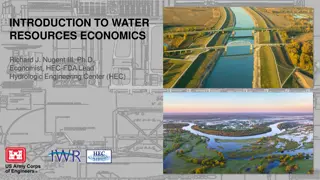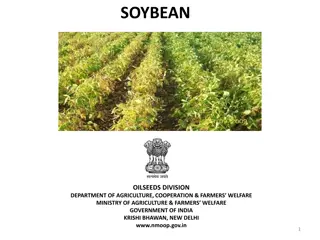Understanding the Significance of Agriculture Economics in India
Agriculture plays a crucial role in the Indian economy, contributing significantly to GDP and rural livelihoods. Agriculture Economics involves the study of resource allocation in the production, distribution, and consumption of agricultural goods. This branch of economics blends principles from general economics with specific agricultural considerations, highlighting the importance of studying it as a distinct field. Explore the nature, terminology, and key concepts of agricultural economics to gain insights into its micro and macro aspects, production functions, and dynamic trends shaping the agricultural sector in India.
Download Presentation

Please find below an Image/Link to download the presentation.
The content on the website is provided AS IS for your information and personal use only. It may not be sold, licensed, or shared on other websites without obtaining consent from the author. Download presentation by click this link. If you encounter any issues during the download, it is possible that the publisher has removed the file from their server.
E N D
Presentation Transcript
UNIT 1 NATURE AND IMPORTANCE OF AGRICULTURE
INTRODUCTION Agriculture is the backbone of Indian economy. Agriculture is the most important occupation for most of the Indian families. In India, agriculture contributes about 16% of total GDP & 10% of total exports. That's reason India secured second position worldwide in terms of farm output. About 75% people are living in rural areas and are still dependent on Agriculture. About 43% of India's geographical area is used for agricultural activity.
Definition of Agriculture Economics Agriculture Economics can also be defined as the knowledge and art Of cultivating the soil of the land" According to Goodwin, "Agriculture Economies is the study of the allocation of scarce resources among those competing and alternative uses found in the production, processing, distribution, and consumption of agricultural commodities.
Nature of Agriculture Economics The nature of agricultural economics is such that it obtains most of the principles from general economics, thus there is no basic difference between general and agricultural economics. Thus the need to separate these two is that agricultural economics does not imply direct application of the principles but before application they are modified so that their postulates totally tally with the situations. These modifications are so large and varied that there is a complete justification for studying it as a separate branch of knowledge.
Nature of Agriculture Economics Terminology Microeconomics Macroeconomics Static economics Dynamic economics Resources Wants Profit Utility Consumption economics
Nature of Agriculture Economics production economics Production function Marginal product Total product Average product Elasticity of production
Nature of Agriculture Economics Nature of agricultural economics: Micro as well as Macro When the subject of study is individual farmer then it is micro- economics and when we study agricultural economy as a whole then it is called macro-economics Static as well as Dynamic The basic difference between the two is that in former , time variable is not taken into account while the latter analysis deals with a period of time. In the present day dynamic concept is gaining momentum.
Nature of Agriculture Economics Applied science or Pure science Agriculturist economics such as Frosten and Leoger have classified it as an applied science as it is concerned with the identification, description and classification of economic problems of agriculture. Thus, agricultural economics is concerned with the evolving of appropriate principles that govern the amount of land, labour, and capital that the farmer should use to maximize his profit and using the factors efficiently.
Nature of Agriculture Economics Science or Art Agriculture is the science and art of cultivation of crops and raising the livestock and is not only a mode of livelihood but also a way of life. Agricultural production economics is a science because it relies on the principles and verifications of the data. It is an art because it deals with the various ways of application of the principles and to suit the conditions.
Scope of Agriculture economics Agriculture sector is considered to be the most important in Indian scenario. The scope of agricultural production economics includes production, distribution, consumption and government activities in relation to agriculture and farm enterprises. To be more specific, the scope of agricultural economics can also be analysed on the political aspect. Self sufficiency in food produce can reduce foreign dependence fro food supply and raw materials , specially in times of crisis. There is a large scope of agri. economics in various factors of production also viz. land, labour, capital, organization etc. The scope of agricultural production economics as quoted by Taylor Agricultural economics deals with the principles which underline the farmers problems of what to produce and how to produce what to sell and how to sell in order to secure the largest net profit for himself consistent with the best interest of the society as a whole.
Principles applied in Agricultural Production Economics 1. Law of equi -marginal return 2. Law of diminishing return 3. Law of opportunity cost 4. Law of substitution 5. Law of comparative advantage 6. Principle of combining enterprises 7. Cost concepts and principles
Importance of Agriculture Economics agricultural economics finds to seek relevance between cause and effect in agriculture. It uses theoretical concepts of economics to provide answers to the problems of agriculture and agribusiness. Agricultural economists here have to play a major role in understanding the complication involved in the foundation systems.
Importance of Agricultural Economics 1- Increases in Per Capita Income 2- Major Source of Employment 3- Reduction in Poverty 4- Supply Of Food 5- Supply of Surplus Labour 7- Source Of National Income 8- Supply of Raw Material 9- Development of Industrial Sector
Role of Agricultural Economics Largest Producer of Milk, Cashew nuts, Coconuts, Tea. Ginger, Turmeric & Black Pepper. Second largest producer of Wheat, Rice, Sugar and Groundnut and Pulses. Third largest producer of Tobacco. Largest Cattle population-281 million Third largest in implementation of Mechanization
SHARE IN NATIONAL INCOME Although the share of agriculture in the total national income has been gradually decreasing on account of the development of secondary & tertiary sectors, it still contributed about 18% of nation income in 2006- 07.(in 1950-51, it was 59%)
SOURCE OF EMPLOYMENT In India, agriculture is the main source of employment. Even in 2004-05, more than 56% of the total labour force of India is engaged in agriculture & depend on it for their livelihood(1950-51:69.5%). It becomes evident from this fact that other sectors of the economy could not generate enough employment for the growing population.
PROVISION OF FOOD GRAINS Agriculture in India has played an important role in meeting almost the entire food needs of the people. The production of food grains in India has increased from 51 million tonnes in 1950-51 to 208.3 million tonnes in 2005-06. This has enabled the country to overcome the problems of food grain shortages. The country almost self sufficient in food grains & no longer depends on import of food grains.
PROVISION OF FOOD GRAINS Agriculture in India has played an important role in meeting almost the entire food needs of the people. The production of food grains in India has increased from 51 million tonnes in 1950-51 to 208.3 million tonnes in 2005-06. This has enabled the country to overcome the problems of food grain shortages. The country almost self sufficient in food grains & no longer depends on import of food grains.
SIGNIFICANCE FOR TRADE & TRANSPORT Various means of transport like roadways & railways get bulk of their business from the movement of agriculture commodities & raw materials
SOURCE OF REVENUE FOR THE GOVERNMENT Through the direct contribution of agricultural taxes to the central & state government is not significant, they get a significant part of their total revenue in terms of land revenue, irrigation charges, taxes imposed on the commodities purchased by the cultivators etc. central government also earns revenue from export duties.
EARNER OF FOREIGN EXCHANGE Through exports of agricultural commodities like tea, cotton, coffee, jute, fruits, vegetables, spices, sugar, oil, etc. in the past, export of agricultural products accounted for about 70% of the export earnings of the country.
SUPPLY OF RAW MATERIALS TO INDUSTRIAL SECTOR Many industries like cotton industry, sugar industries, jute industries etc,. depends on agriculture for their raw material requirements. Moreover, workers engaged in various industries depend on agriculture for their food requirement.
MARKET FOR INDUSTRIAL PRODUCT Agriculture provides markets for large number of industrial products. Since about two thirds of India lives in rural areas, there is a large rural purchasing power which has created a large demand for all type of industrial products. Green revolution has considerably increased the purchasing power of the large farmers in the recent years.
CONCLUSION On over all view, India has always been benefited by AGRICULTURE. Though the future of India is industrialisation, the contribution of agriculture would always prove to be vital for making India a powerful & stable economy in the future.























